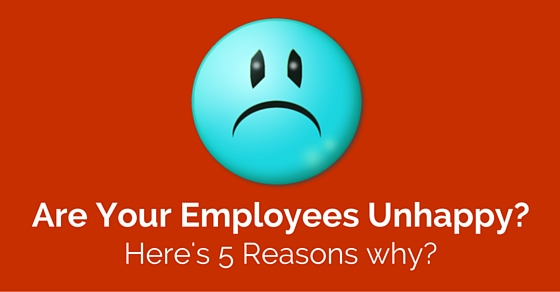Everybody knows that a happy employee is a hard working employee, but what if your employees are already unhappy? You probably have noticed a significant drop in productivity and maybe you are losing great employees to other companies. Sadly, most employees won’t bring up what’s making them unhappy in fear of being labeled a “squeaky wheel.”
So what do you do? Here are five causes you need to honestly consider before announcing Casual Fridays.
Top Reasons Your Employees Unhappy:
1. Wrong Culture for the Company:
When small business owners hear the words “great company culture,” they instantly think of Google’s offices and all the perks they provide. Having the right company culture doesn’t mean having the “fun” and expensive culture. Google has that specific culture for a reason. They want the most skilled and creative people to work for them and to stay with them for the long haul. They know that losing valuable employees to competitors can cost them millions, so they pay for the nice amenities.
On the other end of the spectrum is the stereotypical “Office Space” culture, where employees keep their heads down in their cubicles and avoid interactions with upper management. This business was full of unhappy employees, which could have been solved by finding the correct culture.
Look for employees that are “rebelling” against the current culture. What are they doing, and more importantly, why? Do they hate cubicles and try to work from a conference room or an open space? Is there a support system for coworkers and do they feel like they are part of that support system.
Your company culture needs to be in line with your branding and the types of employees you have. Does your company pride themselves in excellent customer service with outgoing employees? You need to create a culture that revolves around customer satisfaction and in turn, satisfying the needs of your employees. Does your business focus on making a difference in people’s lives? Your employees need to feel that what they are doing is changing the world for the better.
2. Improper Compensation:
Are you paying your employees what they are worth? Do your employees resent their supervisors and you for making so much more money when they are doing all the hard work? Making sure they receive fair compensation helps your employees feel valued.
Everybody wants to get paid more, but maybe that is not the compensation your employees want. Are you offering health benefits or monetary incentives? Consider offering a paid gym membership or additional perk that would interest them.
This is an instance where you can even talk to your employees about what they want. While a few will joke that they want raises, most will be honest in the type of compensation they most prefer. It could be in the form of office parties, an additional reward system, or an employee of the month program.
Do you reward hard work or do you punish mistakes? Most employees respond better to the carrot versus the stick, so examine how you reward your employees.
3. The Office Bully:
When people think of a bully, they remember back to grade school with the mean kid who stole their lunch money. While most workplace bullies don’t go to that extreme, they are still a big problem.
Bullies in the workplace are a big problem in corporate America. Bullies don’t even have to be the ones making offensive jokes or stealing food. They could be the ones starting rumors or being ruthlessly critical of another’s work. Some even work from the shadows, creating conflicts between co-workers discreetly. If you do identify a workplace bully, get involved. Address the issue by informing the employee what they are doing is not acceptable, or by removing them from your business.
4. Employees Don’t Feel Connected:
Employees not feeling connected to the cause or dream of the company results in them only working for a paycheck. Having them feel invested in the business pushes them to do better. If your employees feel that what they are doing has a direct result on the success of the business, they will work harder.
Setting realistic, but difficult goals is one way to motivate employees. Look at last month’s benchmarks and have a meeting with your employees. Have them take part in the goal setting process, selecting their own reward for meeting the goal, and making them accountable for accomplishing it. Give them the information to track their progress and let them go to work. Not only will they push themselves to work hard, but it will create a sense of community among coworkers to help and encourage each other.
Employees not only need to feel connected to the business and each other, but to upper management. Consider getting into the trenches occasionally to show you know what they are going through. Work outside of your private office and in the general space. Interact with employees outside of “work matters.”
Along with that, acknowledge success. Did an employee close a large sale? Throw a little celebration for them. Explain the direct impact their efforts had, and they will want to try even harder.
5. You Aren’t Happy:
If the boss isn’t happy, nobody’s happy. A manager or boss in a bad mood makes all of the employees nervous and negative.
Come to work with a positive attitude and your employees will notice. If your employees see you working hard and being happy, that mood will spread through the company. Make sure all of your upper management understands this also. Having the leadership of the company happy also shows your confidence in the future of the company and helps employees feel at ease. When the boss is upset, employees worry about the security of their jobs and their futures.
The next step after determining the cause is to make a plan. Change is difficult in a business, with a tendency to slip back into old habits. Make employee happiness a top priority and they will make your business their top priority.








































